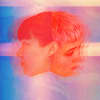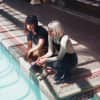FADER Mix: Crater
The Seattle electronic duo’s mix reflects the Pacific Northwest’s misty techno landscape.
Crater—the project of Seattle-based electronic pop duo Ceci Gomez and Kessiah Gordon—recently released its full-length debut, Talk To Me So I Can Fall Asleep, a complex record that's fully produced by Gomez and Gordon themselves. On it, digital sounds are woven with human vocals to create dark, bizarro pop songs that are at once acutely temporal and serenely robotic (their "Hardly At All" video is a prime example). Crater's FADER Mix features fellow electronic artists from the Seattle area and around the Pacific Northwest, including artists such as Free Music, who Gomez told us "only uses analog gear and has been known to queue up floppy discs, cassettes, and all kinds of other gadgets" in his live shows, and Archivist, who is a member of Second Nature, a "rad electronic collective that throws some of the best underground techno shows" in Seattle. Tune in for a mix that reflects the PNW's rainy techno landscape.
Where are you right now? Please describe your surroundings.
CECI GOMEZ: I am sitting in my music room in Seattle overlooking Lake Washington and snowcapped mountains. It’s not raining. Very rare.
Tell us a bit about this mix—what do you imagine people doing while listening to it? What was the vibe while making it?
I made it while I had the flu so it works pretty well if you listen to it in bed. It might also pair nicely with a long drive during a rainstorm.
You’ve emphasized that, as two women, you write, produce, record, and perform everything yourselves. Why is it important (to you and to us) that that is known?
Why do you think so many women in music are rallying behind Björk in her efforts to claim what is rightfully hers? She is unquestionably one of the most important female producers of our time and yet she is still being challenged by idiots over "authorship" and the "authenticity" of her work.
Theoretically gender shouldn't matter (that is the goal, isn't it?) but the bottom line is that the music industry is still dominated by men, and until the the playing field is evened out, we will continue to encourage listeners to grapple with these prevailing issues that exist within all artistic mediums, not just music.
And while we're on the subject of giving credit where it's due, our good friend Ben Roth was instrumental in conceptualizing a handful of guitar parts featured on our record. We don't claim to have done everything, just 99.9% of it.
Can you tell us about using “found sounds” and “internet treasures," and the influence and exploration of the digital world in your music?
The ease of taking screenshots and grabbing images from Tumblr, Google searches, Instagram, Twitter, and Facebook has contributed to the chaos that is my computer desktop. My “Black Hole” folder serves as an archive of thought and is a history of what I have been intrigued by on the internet since 2012. Whenever I’m looking for some kind of daily creative inspiration I’ll scroll through the folder until I come upon something that catches my eye. It comforts me to know that this folder is a continuation of my mind that I can access at any point whenever I’m feeling bored or uninspired.
What kind of instruments do you use in your live shows?
Crater has had several live iterations ranging from a two-piece to a six-piece band. As a duo, I use a SP555 Sampler, a midi keyboard linked up to Ableton, and a chain of vocal pedals. Kess plays the guitar/bass, keys, and also triggers samples from her SPDSX linked to an archaic MIDI foot controller. For our record release show we had six players on stage executing live and sampled drums, synths, bass, and guitar. Our band takes on more of a rock formation the more players we have.
Do you have favorite sounds? Favorite instruments?
Recently my favorite sounds have been coming from NASA’s Soundcloud. Favorite instrument: the Wintergatan Marble Machine.
How do you imagine the future of the internet?
The future of Seattle and PNW music?
The future of Seattle is a bit scary to think about, considering the ever rising cost of living associated with the city's rapidly growing tech industry. The heavy presence felt by these companies (Amazon, Microsoft, tech startups) is causing the displacement of artists from their creative spaces that I think will eventually cause some sort of mass exodus. On the other hand, this looming corporate shadow has also bonded the art community immensely and individuals are creating bodies of work as a direct response to it.
What's the last book you read that had a big impact on you?
Bluets by Maggie Nelson has been very important to me in recent months and I highly suggest it to anyone who has gone through a break up recently. My favorite quote from it:
“Eventually I confess to a friend some details about my weeping—its intensity, its frequency. She says (kindly) that she thinks we sometimes weep in front of a mirror not to inflame self-pity, but because we want to feel witnessed in our despair. (Can a reflection be a witness? Can one pass oneself the sponge wet with vinegar from a reed?)”
And finally, what's your favorite dish to cook and how do you make it?
Lemon bars! It’s magic because it’s just butter, sugar, lemons, and more butter.
Tracklist:
1. Natasha Kmeto - "Stubborn"
2. Ocean Hope - "Forever (Kid Smpl Remix)"
3. Archivist - "A Rogue Moon"
4. Free Music - "Simulant"
5. DJAO - "Warm Scan"
6. Simic - "CL Jam"
7. AOS - "Limerence"
8. Crater - "Gross Relations (Ricky Eat Acid Remix)"
9. Briana Marela - "Dani"

